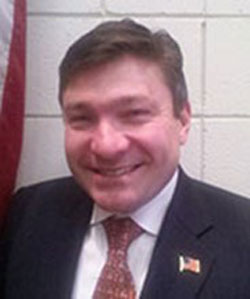 MilitarySupportiveColleges.com had the privilege of speaking with Dr. Brett J Morash, instructor of Strategic Studies and Defense Analysis at Norwich University. He took the time to share his own experiences and thoughtful perspectives on what it means to support active service members pulling double-duty as college students.
MilitarySupportiveColleges.com had the privilege of speaking with Dr. Brett J Morash, instructor of Strategic Studies and Defense Analysis at Norwich University. He took the time to share his own experiences and thoughtful perspectives on what it means to support active service members pulling double-duty as college students.Dr. Brett J. Morash of Norwich University, instructor of Strategic Studies and Defense Analysis
Brett Morash is a retired U.S. Naval Officer with 20 years’ experience at sea including multiple overseas tours. His military decorations and awards include the Defense Meritorious Service Medal, the Meritorious Service Medal, three Naval Commendation Medals, three Navy Achievement Medals, and various unit and service awards. He has also been awarded the 2006 Surface Navy Association Award for Operational Research, the 2004 Naval War College Naval Intelligence Admiral Ike Kidd Award, the 2004 Atlantic Fleet Tactician of the Year Award, 2003 Surface Navy Association Arleigh Burke Award for Operational Excellence, and the 1994 Atlantic Fleet Shiphandler of the Year Award.After retiring from the Naval Service, Dr. Morash became the Vice President of Veterans Services at Services for the UnderServed, and later Director of Operations and Finance at the Bob Woodruff Foundation. He is currently the Executive Director of Racing for Heroes.
Dr. Morash holds multiple degrees, including a B.S. in Marine Transportation from Massachusetts Maritime Academy, an MBA from Framingham State University, and a master’s degree in Strategic Studies from the U.S. Naval War College. Additionally, he was awarded a doctorate in the Humanities, at Salve Regina University. He has been an adjunct professor at Norwich University since 2012, where he teaches courses in the Strategic Studies and Defense Analysis program.
In 2014, an active duty service member enrolled at Norwich University found himself in a bind. While most college students find it challenging enough to simply get through the rigors of assigned coursework, this one was working on a master’s degree while also forward deployed in Iraq serving in a special operations unit.
With the intensive demands and time-sensitive nature of the mission he was assigned to, he found himself needing an extension on a seminar paper. His professor, Navy Veteran Dr. Brett Morash, was quick to intervene. “What he really needed was not only an extension,” Morash told MilitarySupportiveColleges.com, “but also help from the university writing center.”
The extension was granted, of course, and the writing center was there to help. And when the assignment was complete and submitted, Dr. Morash received what he described as, “one of the best grad school papers that I’ve seen.”
Morash was so impressed, in fact, that he arranged for the paper to be published in an academic journal.
Military supportive universities like Norwich offer students the opportunity to learn from faculty members who understand the military experience and who offer the kind of guidance that empowers military affiliated students to succeed on their own.
To Morash, this was another opportunity to help a student struggling to balance the dual-demands of degree requirements and deployment. It’s the kind of support he and his colleagues at Norwich had provided to active duty and Veteran students many times before.
“I think the important piece here is that every student is treated as an individual. And because everyone's circumstances are so unique, Norwich is really there to make sure we're taking care of those students.”
Learn More about Norwich’s Military Legacy.
Dr. Morash’s Own Military Experience Informs His Approach to Teaching
A retired U.S. Navy Surface Warfare Officer, Morash served for 20 years. After retiring and earning his doctorate, he took on an adjunct position at Norwich University where he’s been for more than 10 years.
Reflecting on his time in the Navy, Morash recognizes that his military career began at a unique moment in history and unfolded over a period that would help define the modern military.
“I joined the military right after the Cold War ended. So, most of my senior leaders then were framed in the Cold War. But most of my career is actually post-9/11.”
Dr. Morash had already been in the service for seven years on that fateful morning of September 11, 2001 when highjacked planes struck the Twin Towers of the World Trade Center in Manhattan and the Pentagon in Arlington. As the horrific events unfolded that day, he knew nothing would ever be the same again for the American military, or for the community of nations that allied with the U.S. in the Global War on Terror.
In the months and years that followed, Morash would see a seismic shift in how the U.S. operated around the world. He would witness the growth of the military and a restructuring of the U.S. intelligence apparatus. He would also see the emergence of a whole new intersection between national defense and political science.

Serving aboard a Navy vessel during the Global War on Terror, Morash was stationed in East Africa and assigned to a combined joint task force that brought together members from every branch of the U.S. Armed Services, along with allied foreign nationals.
It was during these years that Morash worked within the highest levels of government, contributing to strategies that would set the stage for how the U.S. would engage enemy strongholds within the borders of nation states we supported at the time. And it was these experiences that prepared him to be the kind of professor who would later depart from conventional book-teaching methods and instead teach from experience.
Today, years later, students with the privilege of attending Dr. Morash’s classes benefit from those experiences, learning under the instruction of a former Naval officer with a full military career and a lot of practical knowledge.
Learn More about Norwich’s Military Support.
Through the lens of those experiences, he’s able to take his students through practical examples, from tactical ground-level strategies to higher-order strategic decision-making. And Morash has seen the effect of this first-hand in the students he instructs: Military training equips service members to be effective soldiers, while an education from a military supportive university has the potential to make them into effective leaders and decision makers.
Blending Nonprofit Leadership with Proactive Support
Outside the classroom, Dr. Morash is just as much an advocate and active supporter of service members, Veterans, and their families. His commitment to the military community can be seen in every aspect of his professional life. Outside of teaching military affiliated students, he has also built a career heading-up nonprofits that make it their mission to support Veterans.
But it wasn’t always obvious to Dr. Morash how he would get to where he is today. As the prospect of transitioning out of the military approached, he wasn’t exactly clear on what he was going to do next. “When I was retiring from the military, I didn’t know what I wanted to do,” he told us. But what he did know for sure was that whatever he would be doing, it was going to involve serving the most vulnerable members of the military community: Veterans.
So, when he happened across an advertisement for a Veteran-focused nonprofit, he knew he had to learn more. “I didn’t know anything about Veteran services in the civilian space, and I wasn’t even a Veteran yet,” he told us. But with the adaptability and organizational skills he picked up in the Navy, he soon landed a VP position with Services for the UnderServed (S:US) and quickly got to work.
The attitudes and focus areas he tapped into while working for S:US would shape the way he approached the work of supporting Veterans and help him develop a better understanding of exactly what they need – everything from mental health supports, to suicide prevention, to homeless services, to employment.

Now the Executive Director of Racing for Heroes, Morash focuses on supporting Veterans by giving them the chance to live the dream of being involved in motorsports. As Dr. Morash put it, the organization helps build, “a sense of community around race cars and around Veterans working on race cars.”
“You're together in a team again. And the mission there is to get the race car on the track and try to win. And if you don't win, you bring it back to the barn and you work on it again. You hit it again next week.”
This collaborative, team-building process is something Veterans are familiar with from their time in service, and something that comes natural to them in the competitive arena of motorsports. Racing for Heroes has been profoundly beneficial to the Veterans involved in the program, and a whole lot of fun too.
Dr. Morash continues to build on every one of the experiences he takes away from his involvement in the nonprofit space. Each one is an opportunity to learn more about how he can better serve Veterans and military-affiliated students. As he put it, “I’ve armed myself now with ten years plus of experience in the civilian space learning about how the Veteran community works.”
From resume-building and professional development outside the classroom, to helping “translate their military experience into civilian speak,” Dr. Morash helps offer the guidance his students need to succeed in school and achieve the careers they deserve upon graduating.
For Morash, supporting Veteran students is a pay-it-forward method of giving back. “When I look at my last couple years in service,” he told us, “I was very fortunate to be stationed at a place where there was a lot of what I call ‘orgs,’ or old retired guys and old retired gals, who were there to kind of give me some advice.”
Dr. Morash takes it upon himself to serve in that same capacity, while also looking for avenues through which he can introduce Veterans to broader networks and new communities where they can find both the resources and the opportunities they deserve.
“And so, when I have a new Veteran coming in just leaving active service, I'm able to help them.”
Military Educator, Veteran Advocate
Dr. Morash is a firm believer in the importance of education and is unequivocal about his advice to any service member or Veteran on the fence about earning a degree.
“When it comes to going to school, I think the short answer should be, well, of course you should go to school… But the more complex question is, ‘What should you do once you get there?’”
Dr. Morash believes the best way to answer that question is to start by identifying an objective. To help guide their planning toward this long-term goal, he calls on students to imagine where they could be in 10 years.
“If they tell me they want to be a physicist working for NASA,” he said, “what type of schooling do you need to do that? Where do you need to go if you want to have a shot at NASA?”
Developing a goal-focused framework for career planning helps fill in the blanks for all the questions that come up about the incremental steps it takes to get there. Working back from the end objective can make it much easier for students to begin charting a course to their professional futures.

This goal-focused approach to career planning has served his students well and has given the Veterans he works with through Racing for Heroes plenty to think about too. Even for those who really don’t want to go back to school and earn a degree, it brings the realization that any rewarding profession is going to require preparation and learning.
“I’m helping them get into automotive trade schools or things like that,” he said, “where they are taking their passion for maybe what they did in the military, like working on a truck or working on a jet engine and translating that directly into an education that gives them the certificate on the back end where they can do what they love doing.”
“That's how I look at education. If you want to do something that is rewarding and is going to be a lifelong vocation, then you’re going to have to get educated in some way, shape, or form in order to get to that point.”
Still, Dr. Morash stresses that as military personnel consider their career options, they need to be realistic about the competitiveness of the job market. Those who have degrees, he says, typically win out on hiring decisions over those who don’t.
Earning Your Degree from a Military Supportive College
Professors with military experience fundamentally understand the challenges that active or formerly active service member students run into. And through this shared understanding, students have the opportunity to build life-long mentor connections.
Six months after granting the extension and grading that publish-worthy paper, Dr. Morash received an unexpected visit from that former student returning from his tour in Iraq. “He brought a piece of gear that had been blown up in the operation that he was on, just to show me that he wasn’t making the story up, that he really was in theater.”
The piece of battle-scarred gear hangs on the wall in Dr. Morash’s office today, a testament to the courage of that student and a reminder of why it’s an honor and privilege to help service members and Veteran students attain their goals.
“It always reminds me that our students are doing real-world things and they have real-world problems,” he said. “We’re there to support them and make sure that they’re getting that education. But at the same time, we need to remain cognizant that our military students that are forward deployed are taken care of.”
Request Information On Norwich University.





